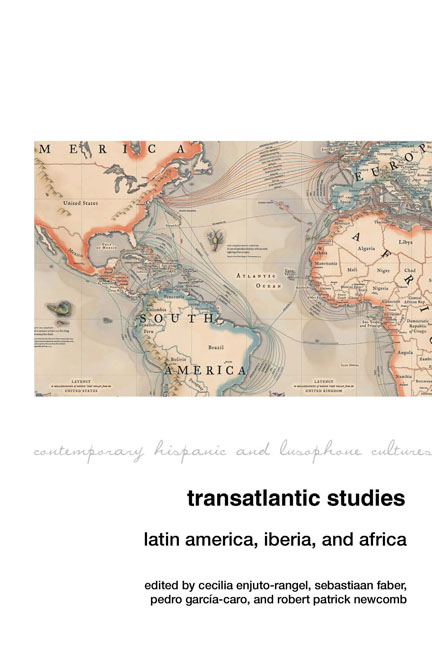Book contents
- Frontmatter
- Contents
- Introduction: Transatlantic Studies: Staking Out the Field
- Transatlantic Methodologies
- Transatlantic Linguistic Debates
- Transatlantic Displacement
- Transatlantic Memory
- Transatlantic Postcolonial Affinities
- Transatlantic Influence
- Epilogue: The Futureâif There Is OneâIs Transatlantic
- Index
5 - Transatlantic Studies and the Geopolitics of Hispanism
- Frontmatter
- Contents
- Introduction: Transatlantic Studies: Staking Out the Field
- Transatlantic Methodologies
- Transatlantic Linguistic Debates
- Transatlantic Displacement
- Transatlantic Memory
- Transatlantic Postcolonial Affinities
- Transatlantic Influence
- Epilogue: The Futureâif There Is OneâIs Transatlantic
- Index
Summary
The Geopolitical Shift of Area Studies
Transatlantic Studies is the outcome of a dual shift: a geographical displacement provoked by the geopolitical debunking of area studies and an epistemological rift produced by the new global regime of capitalist accumulation. In the US, the geographical shift in focus from continental regions to oceanic ranges was meant to salvage area studies from their virtual obsolescence while representing an opportunity for European academic circles to break the hegemony of a US-centered area studies agenda. The epistemological rift from hardcore, neopositivistic, and developmental social sciences to relativistic, postmodern, and postcolonial interculturalism was a response to the economically driven and globally experienced cultural turn. This combined shift, from which Transatlantic Studies emerged, translates profound geopolitical realignments, economic transformations, and epistemological quandaries that traverse and make up our global age. As an outcome of this global realignment and of Spain's freshly acquired international status, Hispanic Transatlantic Studies adopted this dual shift and adapted it to a renovated pan-Hispanism which involved the overlapping interests of Spanish capitalism and transnational corporations, so that the former was put to work in the service of the latter under the pretense of a shared cultural tradition, and Hispanic imperial nostalgia became an alibi for global transatlantic geopolitics. As José María Aznar wrote, “Spain is interested in obtaining a greater Atlantic projection […] That's why Spain has to develop a policy of ‘special relations’ with the Americas […] Our common history and culture is the best foundation for sharing markets and collaborating in the international arena” (1994: 170–71).
The crisis of area studies was met in Europe and the US by different strategies. While the Report on the Restructuring of the Social Sciences written by the Gulbenkian Commission (1996) recommended the opening of the social sciences to interdisciplinary research and the adoption of a global and systematic interpretation of contemporary events, the revision actually started in 1993 with the publication of The Black Atlantic by Paul Gilroy. The Ford and the Rockefeller foundations also promoted several projects to revitalize area studies, by redrawing them around maritime flows. The idea of the Atlantic as a geopolitical crucible, first envisioned as a domain of inquiry by European historians like Fernand Braudel and Pierre Chaunu, would eventually evolve from the study of regional formations to the study of oceanic flows of people, commodities, and cultures.
- Type
- Chapter
- Information
- Transatlantic StudiesLatin America, Iberia, and Africa, pp. 67 - 75Publisher: Liverpool University PressPrint publication year: 2019

